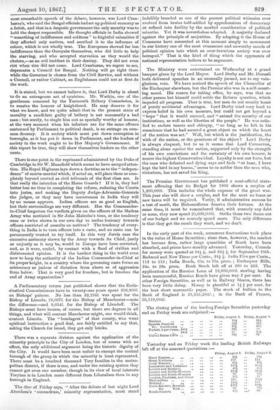The Ministry were entertained on Wednesday at a grand banquet
given by the Lord Mayor. Lord Derby and Mr. Disraeli both delivered speeches in an unusually jocund, not to say vain- glorious, vein. We have noticed the speech of the Chancellor of the Exchequer elsewhere, but the Premier also was in a self-assert- ing mood. His reason for taking office, he says, was that no other person but himself could settle the Reform question, which impeded all progress. That is true, but men do not usually boast of purely accidental advantages. Lord Derby tried very hard to express belief in his own measure, but could not get beyond a " hope " that it would succeed, and " extend the security of our institutions, as well as the liberties of the people." He was satis- fied to endure taunts and obloquy, " so long as he felt in his conscience that he had secured a great object on which the heart of the nation was set." Well, but which is the justification, the wish of the nation, or the greatness of the object? Lord Derby is always eloquent, but to us it seems that Lord Carnarvon, standing alone against the nation, supported only by the strength of his own convictions and the certainty of his own honour, is nearer the highest Conservative ideal. Loyalty is not our forte, but the man who defeated and dying says and feels " at least, I have kept the bird in my bosom," seems to us nobler than the man who, victorious, has not saved his King.






























 Previous page
Previous page